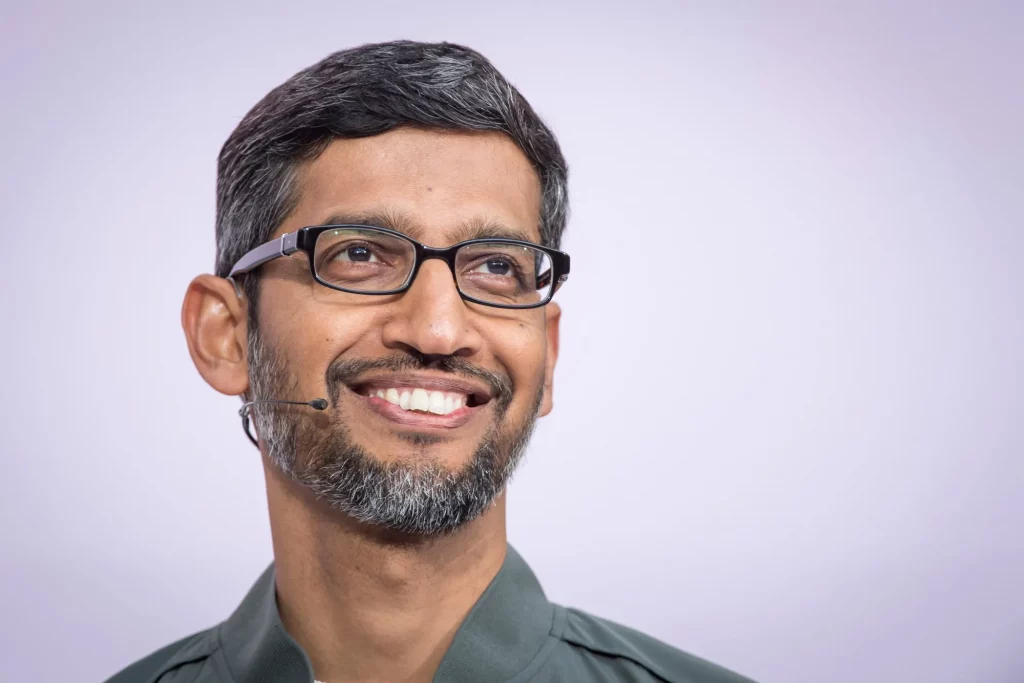Sundar Pichai, born as Pichai Sundararajan, is one of the most influential figures in the technology world, best known as the CEO of Alphabet Inc. and its subsidiary, Google LLC. His journey from a modest upbringing in India to the helm of one of the largest and most powerful technology companies in the world serves as a classic story of resilience, intellect, and leadership.
Early Life and Education
Sundar Pichai was born on June 10, 1972, in Madurai, Tamil Nadu, India. He was raised in a middle-class family; his father was an electrical engineer at GEC, and his mother worked as a stenographer before becoming a homemaker. Pichai showed an early fascination with technology and engineering, which his family supported. Pichai completed his early education in India and went on to earn a degree in Metallurgical Engineering from the Indian Institute of Technology (IIT) Kharagpur, one of India’s most prestigious institutions.
After completing his studies in India, Pichai won a scholarship to Stanford University in the United States, where he pursued an M.S. in Material Sciences and Engineering. Later, he earned an MBA from the Wharton School of the University of Pennsylvania, where he was named a Siebel Scholar and a Palmer Scholar, honors awarded to the top students.
Career Beginnings
Pichai’s professional journey began with engineering and product management roles at Applied Materials, a semiconductor company. He later worked at McKinsey & Company, a global management consulting firm, where he developed his strategic thinking and problem-solving skills. However, it was his move to Google in 2004 that would mark the beginning of a new chapter, setting him on a path to the top of the tech world.
Rise at Google
Pichai joined Google in 2004 as part of the product management team, initially working on the Google Toolbar and later on Google Chrome, the company’s web browser. Chrome was a game-changer and quickly became the most popular browser worldwide, with Pichai’s leadership and vision playing a significant role in its success. His success with Chrome solidified his reputation within Google as a visionary and strategic leader.
After proving himself with Chrome, Pichai was given more responsibilities and began overseeing other products, including Gmail, Google Maps, and Android, following Andy Rubin’s departure. His leadership across multiple platforms showed his ability to understand and grow complex product ecosystems, a rare and valuable skill in technology management.
Appointment as CEO
In 2015, as Google restructured to create Alphabet Inc. as the parent company, Pichai was named CEO of Google. His promotion was widely celebrated within the company and the industry, as he had established himself as a thoughtful, approachable, and effective leader. In December 2019, Larry Page and Sergey Brin, co-founders of Google, stepped down from their roles at Alphabet, and Pichai was named CEO of both Google and Alphabet. This dual role put him at the top of an empire, overseeing not only Google’s core business but also various ventures in artificial intelligence, autonomous vehicles, life sciences, and more.
Leadership Style
Pichai’s leadership style is characterized by calmness, empathy, and inclusivity. Known for his collaborative approach, he encourages open communication and values input from all levels of the organization. Unlike many tech leaders who rely on forceful personalities or aggressive strategies, Pichai leads with humility and patience. He is known to be thoughtful in his decisions, valuing long-term goals and the well-being of his team members.
Key Contributions and Vision
Under Pichai’s leadership, Google and Alphabet have made significant advancements in AI, cloud computing, and hardware. Google’s AI-first strategy, which emphasizes the development of artificial intelligence to power its products and services, was championed by Pichai. His vision for the future of Google includes not only technological advancements but also ethical considerations in AI, digital inclusion, and a commitment to reducing the company’s environmental impact.
Pichai has been vocal about the need for responsible AI development, addressing privacy concerns and the potential impact of AI on jobs and society. His advocacy for AI regulation has placed him at the forefront of discussions on tech ethics and the role of corporations in safeguarding user rights.
Challenges and Criticisms
While Sundar Pichai’s tenure as CEO has been marked by numerous successes, he has faced significant challenges as well. Google has been scrutinized for its handling of data privacy, monopoly accusations, and employee protests over various social and ethical issues. Pichai has worked to address these concerns through transparency and policy changes, though some critics argue that the company could do more. Leading a company of Google’s size and influence inevitably brings scrutiny, and Pichai has had to navigate these issues with caution and diplomacy.
Legacy and Future Vision
Sundar Pichai is often described as a visionary leader who balances innovation with a sense of social responsibility. As the CEO of Alphabet and Google, he continues to guide the company through a rapidly changing technological landscape, pushing for advancements in AI, quantum computing, and digital services while addressing the ethical and societal implications of these technologies. His calm demeanor, combined with a deep understanding of technology and business, has made him a respected figure both inside and outside the tech industry.
As Pichai continues to lead Alphabet, he is expected to play a key role in shaping the future of technology, with a focus on making digital services more accessible, ethical, and beneficial for all of society. His journey serves as an inspiration to many, showing that a combination of hard work, intellect, and integrity can lead to success at the highest levels of global business.



